Fiber-Rich Foods That Aid Digestion
Adding the right foods to your diet can help your digestion. The Mayo Clinic says fiber…
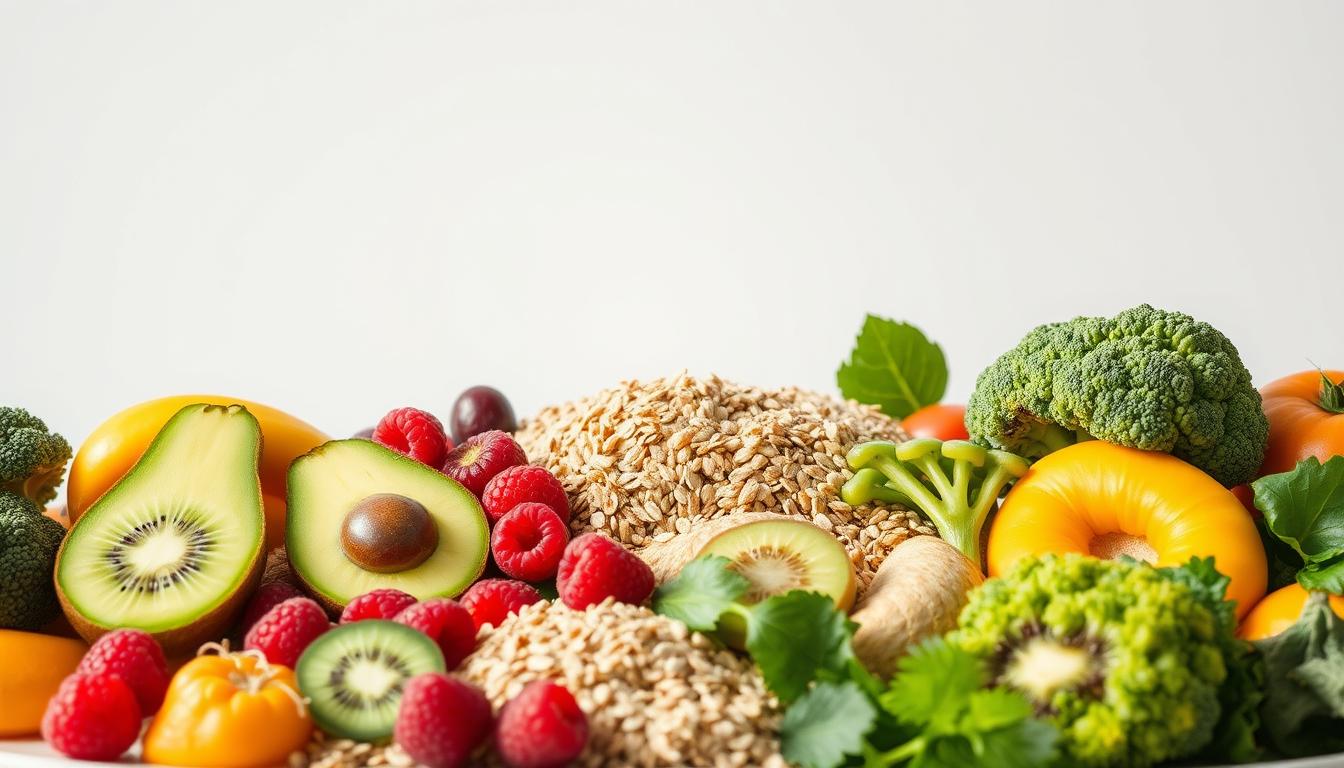
Adding the right foods to your diet can help your digestion. The Mayo Clinic says fiber is a carb found in plants like fruits, veggies, whole grains, and legumes.
Eating whole, natural foods helps your digestion. A fiber-rich diet can make you feel better overall.
Key Takeaways
- Add plant-based foods to boost your digestion.
- Eat whole, natural foods for better digestion.
- A fiber-rich diet improves your health.
- Fruits, veggies, whole grains, and legumes are full of fiber.
- Good food choices can greatly help your digestion.
What is Dietary Fiber and Why It Matters?
Dietary fiber is important for your digestive health. It’s found in plant-based foods. It helps food move smoothly through your body and prevents constipation.
Soluble vs. Insoluble Fiber
Dietary fiber has two types: soluble and insoluble. Soluble fiber, like in oats and apples, turns into a gel. This slows down digestion and helps with cholesterol and blood sugar.
Insoluble fiber, in whole grains and nuts, makes your stool bulkier. This helps with regular bowel movements.
Health Benefits of Fiber
Eating enough fiber is good for you. It prevents constipation and helps with cholesterol and blood sugar. It also lowers the risk of heart disease and diabetes.
Daily Fiber Recommendations
The National Academy of Medicine says women need 21-25 grams of fiber daily. Men need 30-38 grams. You can get this from fruits, veggies, whole grains, and legumes.
For example, an apple has about 4 grams of fiber. A cup of cooked lentils has 16 grams. Eating these foods helps you meet your fiber needs and keeps your digestive system healthy.
Top Fiber-Rich Fruits for Digestion
Fruits are tasty and help you get more fiber. They also give you important nutrients and antioxidants. These help your digestive system work well.
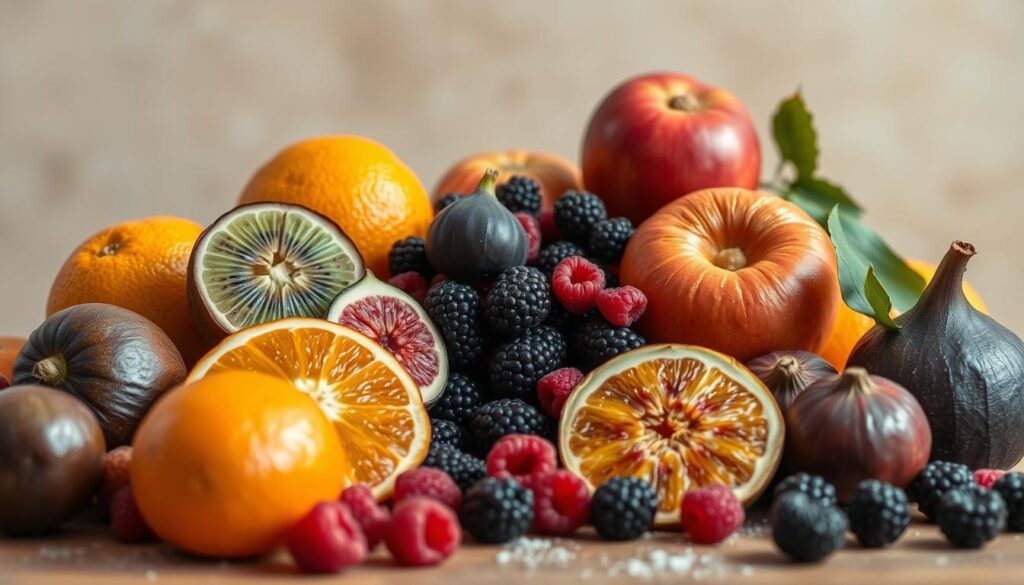
Apples: A Crunchy Helper
Apples are full of dietary fiber. A medium apple has 3-4 grams of fiber. This fiber helps your bowels move well and stops constipation. You can eat apples as a snack or add them to salads.
Berries: Antioxidants and Fiber Combined
Berries like strawberries, blueberries, and raspberries are full of antioxidants and fiber. A cup of berries has 2-3 grams of fiber. You can eat them fresh, frozen, or dried. They’re great in your diet.
“A diet rich in fruits like berries can significantly contribute to overall health and well-being.”
Bananas: A Gentle Digestive Aid
Bananas help with digestion because of their fiber. They’re also easy on your stomach. Bananas are perfect as a quick snack or in smoothies and oatmeal.
Eating these fiber-rich fruits can really help your digestion. But remember, a healthy diet is more than just fiber. Drinking enough water and eating well are also key.
Essential Vegetables Rich in Fiber
Vegetables are tasty and full of fiber. They are great for your meals. Broccoli, carrots, and spinach are top picks for fiber and health.
Broccoli: A Nutrient-Packed Choice
Broccoli is a special veggie with lots of fiber, about 2.5 grams per cup. It’s also full of vitamins C and K. Plus, it has compounds that fight inflammation. You can steam it or add it to salads.
Carrots: Sweet and Satisfying
Carrots are fiber-rich, with 2-3 grams per cup. They’re crunchy and sweet. They also have vitamin A for good eyesight and a strong immune system. Enjoy them raw, steamed, or roasted.
Spinach: Leafy Green Goodness
Spinach is a leafy green full of nutrients, including fiber. It’s good in smoothies, salads, pasta, and stir-fries. It’s also full of iron and antioxidants for health.
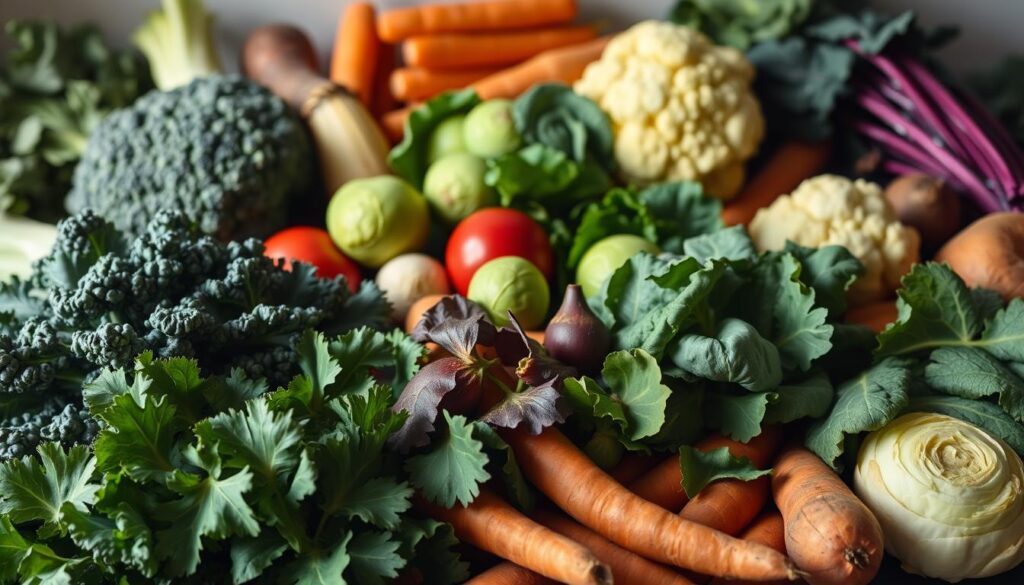
Adding these veggies to your diet boosts fiber and vitamins. “Eating colorful veggies is simple to get many nutrients.” So, add broccoli, carrots, and spinach to your meals for health benefits.
Whole Grains and Their Digestive Benefits
Whole grains are key for a fiber-rich diet that helps digestion. Adding them to your meals boosts gut health and well-being.
Grains like oats, quinoa, and barley are full of dietary fiber. This fiber is important for a healthy digestive system. These grains also give us important nutrients for our body.
Oats: A Breakfast Champion
Oats are packed with soluble fiber, like beta-glucan. This fiber helps control blood sugar and cholesterol. Eating oatmeal for breakfast keeps you full and aids digestion all day.
Quinoa: The Protein-Packed Grain
Quinoa is a special grain with lots of protein and fiber. It has about 8 grams of fiber per cup. Adding quinoa to your meals boosts digestion and meets your protein needs.
Barley: A Wholesale Fiber Winner
Barley is a fiber-rich grain that’s good for digestion. You can use it in soups, stews, and salads. It’s a great addition to your diet.
Eating different whole grains has many benefits. These include:
- Helping keep blood sugar levels healthy
- Encouraging regular bowel movements
- Improving overall digestive health
To enjoy whole grains’ benefits, include them in your meals. Try oatmeal for breakfast, a quinoa salad for lunch, or barley in dinner soups.
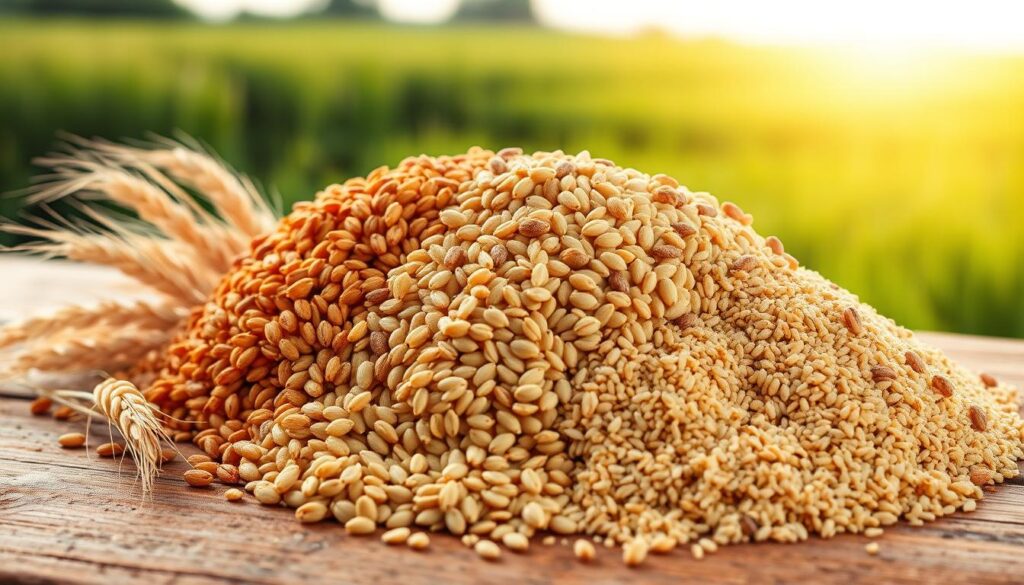
By making whole grains a regular part of your diet, you improve your digestion and overall health.
Legumes: The Ultimate Digestive Powerhouses
Legumes are key in a fiber-rich diet plan. They help your digestion a lot. These foods are full of fiber and protein, making them great for many meals.
Lentils, chickpeas, and black beans are top choices for digestion. Each one has special nutrients that help your body stay healthy.
Lentils: A Fiber-Rich Choice
Lentils have lots of fiber, about 7.8 grams in half a cup. They’re easy to add to many dishes, like soups and salads.
Chickpeas: More Than Just Hummus
Chickpeas are also high in fiber, with 6.2 grams in half a cup. They’re not just for hummus. You can also use them in salads, stews, and curries.
Black Beans: Hearty and Healthful
Black beans are full of fiber and protein. They’re great for many dishes, from Mexican food to stews.
Eating these legumes can help your digestion. They make bowel movements regular and give you important nutrients. Adding legumes to your fiber-rich diet plan is a big step towards better digestion.
Nuts and Seeds to Include in Your Diet
Adding nuts and seeds to your meals can really help your digestion. They are tasty and full of good stuff.
These natural foods for digestion are perfect for a high fiber foods list. They add crunch and can be mixed into many dishes. Here are some top picks for your diet.
Chia Seeds: Tiny but Mighty
Chia seeds are full of fiber, with about 4-5 grams per tablespoon. They also have omega-3s and antioxidants. This makes them great for your gut.
Almonds: A Crunchy Snack for Fiber
Almonds give you about 3.5 grams of fiber per ounce. They’re a tasty, healthy snack. You can eat them alone or add them to food.
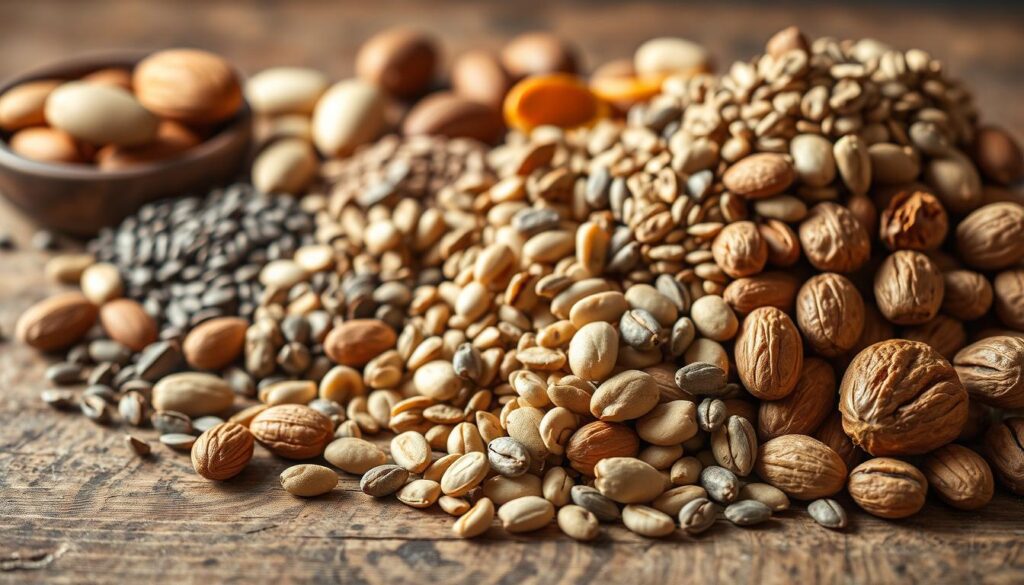
Flaxseeds: Rich in Omega-3 Fatty Acids
Flaxseeds are full of omega-3s and have about 3 grams of fiber per tablespoon. They’re easy to add to your meals. They help your digestion and heart.
Adding chia seeds, almonds, and flaxseeds to your meals boosts your fiber. These foods are good for you and taste great. They’re easy to add to your daily food.
Dairy Alternatives with Fiber
Looking for dairy-free options that help with digestion? There are many fiber-rich choices out there. You can add them to your daily routine to boost your digestive health.
Nutty and Digestive-Friendly Almond Milk
Almond milk is a favorite dairy-free option. It’s low in calories and full of fiber. It’s great for digestive health. You can drink it alone, mix it with cereal, or blend it into smoothies.
A Creamy Option: Coconut Yogurt
Coconut yogurt is another top pick. It’s packed with fiber and has a creamy feel. Use it in parfaits or as a topping for desserts.
Soy Milk: A Great Source of Protein and Fiber
Soy milk is full of protein and fiber. It’s great for cooking, baking, or drinking. It helps with digestive well-being.
Adding these dairy-free options to your diet can bring many benefits. You’ll get better digestion and a more exciting diet. If you’re cutting down on dairy or just want to try new things, these fiber-rich choices are a good start.
Fiber-Rich Snacks You Will Love
You don’t have to give up taste for health. There are many tasty, fiber-rich snacks out there. Adding these snacks to your diet can help your digestion and give you important nutrients.
Popcorn: A Guilt-Free Crunch
Popcorn is a whole grain with lots of fiber. It’s a great snack choice. You get about 5-6 grams of fiber per cup. It’s a guilt-free snack for your crunchy cravings.
To make it healthier, try air-popping it. Don’t microwave it. Season it with herbs and spices for extra flavor.
Trail Mix: Customizable and Convenient
Trail mix is another great snack for fiber. You can mix nuts, seeds, and dried fruits to your liking. A mix of almonds, cashews, pumpkin seeds, and dried cranberries gives you fiber and antioxidants.
Energy Bars: Portable Fiber Sources
Energy bars are perfect for when you’re busy. Choose bars that are high in fiber and made with good ingredients. Many brands offer fiber-rich energy bars. They’re a convenient way to get fiber.
Always check the nutrition label to make sure it fits your diet.
Some key benefits of these snacks include:
- Increased fiber intake: Helps with healthy digestion.
- Customization: You can pick ingredients you like.
- Convenience: Great for snacking on the go.
As Dr. Jane Smith, a renowned nutritionist, said, “Adding fiber-rich snacks to your daily routine can boost your digestion and health.” By choosing snacks like popcorn, trail mix, and energy bars, you’re moving towards a healthier life.
Meal Ideas to Incorporate Fiber
Adding fiber-rich foods to your diet can change your digestion for the better. Just a few simple meal changes can boost your fiber intake. This supports healthy digestion with fiber.
Breakfast Bowls: Starting Your Day Right
Start your day with a breakfast bowl full of fiber. Mix oats, fresh berries, and sliced bananas for a tasty meal. Add chia seeds or chopped almonds for extra fiber. For more ideas, check out Mayo Clinic’s High-Fiber Recipes.
Lunch Salads: Fresh and Filling Options
For lunch, make a salad with veggies, beans, and whole grains. A mix of spinach, black beans, quinoa, and colorful veggies is great. Add chickpeas or lentils for more protein and fiber. Try different mixes to keep your meals exciting and fiber-rich.
Dinner Dishes: Fiber-Rich Recipes
Dinner is a good time to add more fiber. Cook meals with legumes, whole grains, and lots of vegetables. A stew with lentils and veggies, served with whole grain bread, is nutritious. Or, make a stir-fry with veggies, chickpeas, and brown rice for a quick dinner.
By adding these meals to your routine, you can follow a fiber-rich diet plan. It’s important to make small changes and drink lots of water. This helps fiber move through your body.
Tips for Increasing Fiber Intake Gradually
Start small to boost your fiber intake. Make small changes and stick to them. This way, your body can adjust slowly. It will help avoid any discomfort.
Hydration Matters
Drink lots of water when you increase fiber. Fiber needs water to work well. It helps move food through your body. Drink at least eight glasses of water a day to stay regular.
Read Nutrition Labels Carefully
Reading labels is key to making good food choices. Look for foods that are rich in dietary fiber. Avoid foods with too much sugar, salt, and bad fats. This helps you pick the best foods for your diet.
Consider Fiber Supplements
If you can’t get enough fiber from food, talk to a doctor about supplements. Supplements can help, but always choose one your doctor recommends. They ensure you get what you need.
Follow these tips and be patient. You can increase your fiber intake. This will make your digestive system healthier.
Conclusion: Embracing Fiber for Better Digestion
Eating foods high in fiber can really help your health. Focus on whole grains, fruits, veggies, legumes, nuts, and seeds. This helps your digestion and lowers the risk of serious diseases.
Long-Term Benefits
A fiber-rich diet brings many benefits. It helps you go to the bathroom regularly and keeps blood sugar stable. It also lowers the risk of heart disease and some cancers. For more on fiber’s benefits, check out the Mayo Clinic’s guide on dietary fiber.
Making It a Habit
To make fiber a part of your life, start slow and drink plenty of water. Always check food labels to see if they have enough fiber. These easy steps can help your digestion and make you feel better overall.
FAQ
What are the best high fiber foods for digestive health?
Good high fiber foods are fruits like apples and bananas. Also, veggies like broccoli and spinach are great. Whole grains like oats and quinoa are good too. Don’t forget nuts and seeds like almonds and chia seeds.
How can I incorporate more fiber-rich foods into my diet?
Start with a fiber-rich breakfast. Add veggies to your meals. Snack on fruits and nuts. Try whole grains and legumes in your cooking.
What is the difference between soluble and insoluble fiber?
Soluble fiber turns into a gel that slows digestion. Insoluble fiber makes stool bulkier, helping with bowel movements.
Can fiber supplements help with digestive health?
Fiber supplements can be helpful. But, talk to a doctor before adding them to your diet.
How much fiber should I be consuming daily for optimal digestive health?
Adults should aim for 25-30 grams of fiber daily. This amount varies by age and sex.
Are there any dairy alternatives that are high in fiber?
Yes, almond milk and coconut yogurt are high in fiber. They support digestive health.
What are some healthy snack options that are rich in fiber?
Good snacks include popcorn and trail mix. Energy bars, fruits, and nuts are also good choices.
How can I make sure I’m staying hydrated while increasing my fiber intake?
Drink lots of water when you eat more fiber. It helps your body digest better.
Can a fiber-rich diet help with weight management?
Yes, it can. A fiber-rich diet makes you feel full. It also supports healthy digestion.
